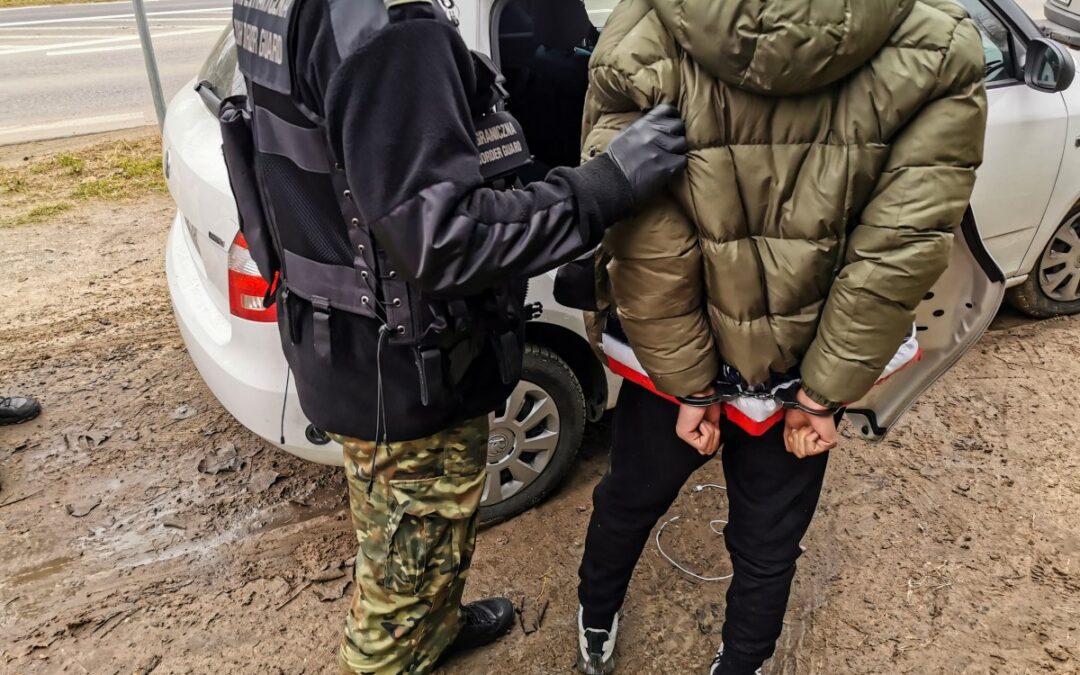Keep our news free from ads and paywalls by making a donation to support our work!

Notes from Poland is run by a small editorial team and is published by an independent, non-profit foundation that is funded through donations from our readers. We cannot do what we do without your support.
The interior ministry has confirmed media reports that Poland is facing a growing wave of “imported crime”, committed in particular by immigrants from Georgia.
He has blamed the “uncontrolled influx of migrants” allowed by the former government and says the current authorities are prioritising dealing with the issue, including by deporting foreign criminals.
Do Polski wróciła brutalna przestępczość jak żywcem wyjęta z lat 90. Z tym że rodzimych gangsterów zastąpili obcokrajowcy ze Wschodu. Eksperci ostrzegają: trzeba nad tym zapanować, zanim gangi się tu zadomowią.https://t.co/DOyT7huAg5
— Rzeczpospolita (@rzeczpospolita) February 2, 2025
On Friday, Rzeczpospolita, a leading daily newspaper, published a report about how “brutal gangs have returned to Poland”, comparing the situation to the kind of violent organised crime that was common in the 1990s during the post-communist transition.
However, “domestic gangsters have been replaced by foreigners from the East”, wrote the newspaper, noting that Georgian migrants in particular are involved in such activities. Rzeczpospolita warned that the situation could get even worse once the war in Ukraine ends as it may result in easier access to guns for criminal gangs.
As an example, the newspaper pointed to a group of three Georgians arrested last year on suspicion of stealing diamonds being transported in Warsaw and of robbing a currency exchange office in the city of Wałbrzych. It also pointed to violent thefts from private individuals in the street.
“Georgian crime is brutal, it resembles acts of terror,” Andrzej Mroczek, a specialist in organised crime and terrorism at Collegium Civitas, a private university in Warsaw, told Rzeczpospolita. Other experts gave the newspaper similar comments.
In 2023, 2,714 Georgian citizens committed crimes in Poland (around 1,200 of those relating to drink driving), according to police data obtained by Rzeczpospolita. That is equivalent to one in ten of the roughly 27,000 Georgians living legally in Poland at the time.
However, the newspaper also notes that, because Georgians have visa-free access to the European Schengen Area for up to 90 days in any six-month period, it is easy for them to enter and move around the European Union.
In the first half of 2024, out of 8,940 crimes committed by foreigners in Poland, 1,071 (12%) were carried out by Georgians. By contrast, Georgians made up only around 2.3% of all immigrants registered in Poland’s social insurance system.
The number of foreigners in Polish prisons has nearly doubled in less than four years amid unprecedented levels of immigration to Poland.
Most foreign inmates are Ukrainians, Georgians and Belarusians , who are also Poland's three largest immigrant groups https://t.co/wPWIfJwDzP
— Notes from Poland 🇵🇱 (@notesfrompoland) July 19, 2024
On Monday, in an interview with Radio Zet, interior minister Tomasz Siemoniak was asked whether Rzeczpospolita’s report of a return to 1990s-style violent, organised crime was true.
“Yes, this is what we are dealing with,” the minister replied. “Imported crime, the rebirth of organised, brutal crime. Citizens of Georgia stand out in a negative way.”
“We are taking steps: arrests, convictions and expelling those people from Poland,” added Siemoniak. “For the police, this is one of the priorities at the moment. We will not allow criminal groups, whether Polish or foreign, to roam here in any way. We are trying to absolutely nip it in the bud.”
Asked about the reasons for the situation, the minister blamed the “uncontrolled influx of migrants in recent years”, including a “completely chaotic – to put it politely – visa policy, which led to the sale of Polish visas and entry here to anyone who wanted it”.
🎥 Szef @MSWiA_GOV_PL o „przestępczości z importu: Przestępczość wróciła do Polski. Nie pozwolimy tutaj hasać zagranicznym i polskim grupom. Dla policji priorytetowe zadanie@RadioZET_NEWS #GośćRadiaZET @TomaszSiemoniak @BogRymanowski
Więcej⬇️https://t.co/CirDxV0cHi pic.twitter.com/7Hbkepl3q7
— Gość Radia ZET (@Gosc_RadiaZET) February 4, 2025
Poland’s current coalition government, which took power in December 2023, has blamed the former national-conservative Law and Justice (PiS) government for talking tough on immigration but actually overseeing an unprecedentedly large and uncontrolled wave of migration to the country.
It has launched a series of investigations into failings and corruption in the visa system that allegedly allowed some migrants to pay to obtain easier access to Poland.
Siemoniak told Radio Zet that “several thousand Georgian citizens have been expelled” and that over a hundred are currently in detention. However, he added that “the vast majority of Georgians are honest citizens”.
Last year, news website Forsal noted that, despite mass migration to Poland in recent years, the overall number of crimes is far lower than 20 years ago. In 2004, for example, 50,000 robberies were reported compared to just 4,000 in 2023. Assaults fell from 14,400 to 2,200 over the same period.
Georgian bakeries have become a common sight in Polish cities amid a boom in immigration from the Caucasian state.
Poland's growing economy has made it an attractive choice, while Georgians also say it feels culturally closer than Western countries https://t.co/hebNClOto3
— Notes from Poland 🇵🇱 (@notesfrompoland) November 20, 2024

Notes from Poland is run by a small editorial team and published by an independent, non-profit foundation that is funded through donations from our readers. We cannot do what we do without your support.
Main image credit: KMP Białystok (under CC BY-NC-ND 3.0 PL)

Daniel Tilles is editor-in-chief of Notes from Poland. He has written on Polish affairs for a wide range of publications, including Foreign Policy, POLITICO Europe, EUobserver and Dziennik Gazeta Prawna.



















